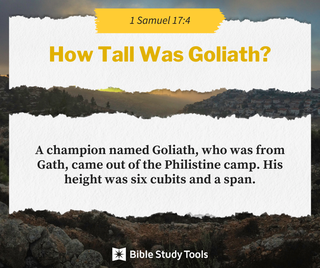
- Recent Translations
- All Translations
1 Samuël 17:7
Share
Settings
Images for 1 Samuël 17:7

1 Samuël 17:7 Meaning and Commentary
And the staff of his spear was like a weaver's beam
The wooden part of it, held in the hand; this for thickness was like the beam in the weaver's loom, about which the warp, or else the web, is rolled; and it is conjectured that, in proportion to the stature of Goliath, his spear must be twenty six feet long, since Hector's in Homer F13 was eleven cubits, or sixteen feet and a half:
and his spear's head weighed six hundred shekels of iron;
the iron part of the spear, the point of it, which has its name in Hebrew from a flame of fire, because when brandished it looks shining and flaming; and being the weight of six hundred shekels, amounted to eighteen pounds and three quarters of avoirdupois weight, and the whole spear is supposed to weigh thirty seven pounds and a half; and the whole of this man's armour is thought to weigh two hundred and seventy two pounds, thirteen ounces F14; which was a prodigious weight for a man to carry, and go into battle with; and one may well wonder how he could be able with such a weight about him to move and lay about in an engagement; though this is nothing in comparison of the weight some men have carried. Pliny F15 tells us that he saw one Athanatus come into the theatre clothed with a leaden breastplate of five hundred pounds weight, and shod with buskins of the same weight:
and one bearing a shield went before him;
which when engaged in battle he held in his own hand, and his sword in the other; the former was reckoned at thirty pounds, and the latter at four pounds, one ounce; though one would think he had no occasion for a shield, being so well covered with armour all over; so that the carrying of it before him might be only a matter of form and state. His spear is the only piece of armour that was of iron, all the rest were of brass; and Hesiod {p}, writing of the brazen age, says, their arms and their houses were all of brass, for then there was no iron; and so Lucretius F17 affirms that the use of brass was before iron; but both are mentioned together, (See Gill on Genesis 4:22), hence Mars is called (calceov arhv) {r}.
F13 Iliad. 18.
F14 Hostius, ut supra.
F15 Nat. Hist. l. 7. c. 20.
F16 Opera & Dies, l. 1. ver. 147, 148.
F17 "De rerum natura". l. 5. & "prior aeris erat"
F18 Homer. Iliad. 5. ver. 704, 859, 864. Pindar. Olymp. Ode 10.